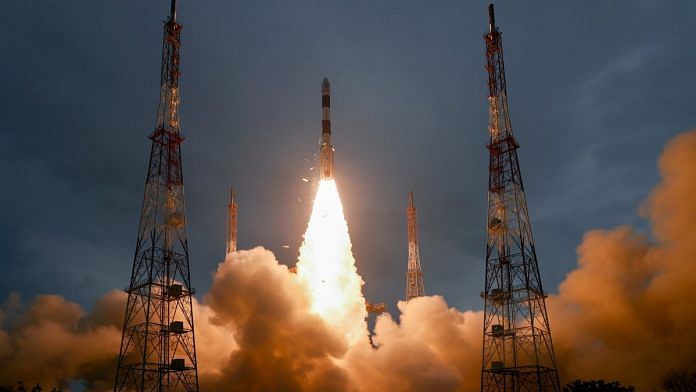In Don’t Look Up, Adam McKay’s 2021 comedy/sci-fi, President Orlean says, “I hear there’s an asteroid or comet or something that you don’t like the looks of. Tell me about it, and then tell me why you are telling me about it.” The movie generated a lot of interest in the economics of asteroids and the capitalist future of space resource mining. Space holds economic value not just because of scientific activities but also due to the commercial, military, and civilian use of outer space resources that benefit humanity. The global space economy is currently valued at about $360 billion, with India accounting for only about 2 per cent.
Today, the Indian Space Research Organisation (ISRO) is considered one of the most cost-effective space agencies in the world. Interestingly, the budget of Don’t Look Up—$75 million—was the same as the cost of Chandrayaan-3, India’s mission to the Moon. With the recent successes of lunar and interplanetary missions such as Chandrayaan-3, Aditya-L1, and the ambitious Gaganyaan projects, India is emerging as a major global space player. India is also leveraging its success in space exploration to build its neighbourhood diplomacy through initiatives like the South Asia Satellite, which provides communication services across the region.
While the militarisation of space has made it a contested arena, it is no longer the exclusive domain of governments. Over the last two decades, profit-driven private innovations have made access to space easier and cheaper. Most spacefaring nations now leverage space-tech developments from the private sector. Today, companies such as SpaceX, Blue Origin, and Virgin Galactic are revolutionising the space sector in the West.
There is an increased market demand for geospatial data, given its potential to strengthen climate change mitigation, enhance food security, and build strong telecommunication channels. India, too, has provided scope for non-governmental entities (NGEs) to participate in the country’s space programme. Last month, the government also approved a policy allowing up to 100 per cent foreign direct investment (FDI) in the sector. However, what India still lacks amid these developments is a legal and regulatory framework.
Also Read: Start-ups welcome govt move to liberalise FDI rules for space sector — ‘long-pending reform’
Private sector takeoff in India
In 2020, the Government of India opened up the space domain to enhance the participation of NGEs in carrying out end-to-end activities. The government followed this up with the introduction of the Indian Space Policy 2023. This overarching and dynamic framework aims to encourage and promote greater private sector participation across the entire value chain of the space economy. With the involvement of private players, the Indian space economy is projected to grow from around $8.4 billion to $44 billion by 2033.
These developments have also attracted investors from India and abroad, resulting in a surge in space funding and partnership opportunities. The number of space tech start-ups in India skyrocketed from just 1 in 2014 to 189 in 2023, according to the startup portal of the Department for Promotion of Industry and Internal Trade (DPIIT).
To facilitate this growth further, the government has prescribed liberalised FDI thresholds for various space sector activities. “Under the amended FDI policy, 100% FDI is allowed in the space sector and the liberalised entry routes are aimed at attracting potential investors to invest in Indian companies in space,” said a government release issued on 21 February 2024.
Also Read: India needs a military-space doctrine, must bet big on private sector firms
A black hole in policy
Space technologies coming from the private sector have democratised innovation. However, there’s a critical gap: India does not have a national space law in place. This absence raises questions on the futuristic vision of the new space policy.
For instance, the policy grants wide powers to two new technical institutions, NewSpace India Limited (NSIL) and Indian National Space Promotion and Authorisation Centre (IN-SPACe), which were hurriedly established to commercialise and privatise space activities in India. The policy, however, fails to mention the role of Antrix Corporation Limited, ISRO’s commercial arm, set up in 1992. With NSIL now positioned as the new commercial wing of ISRO, the role of Antrix is unclear in the present space policy architecture. It is therefore essential that the policy be followed by suitable legislation to clarify these inconsistencies.
While India is actively pushing for innovation, it is lagging on the regulatory front, where the West has already started redrafting the norms of international space law.
Building upon the Outer Space Treaty of 1967, the United States Department of State and the National Aeronautics and Space Administration (NASA) developed a framework for the ‘Principles for Cooperation in the Civil Exploration and Use of the Moon, Mars, Comets, and Asteroids for Peaceful Purposes’, popularly known as the ‘Artemis Accords’. This non-binding set of principles is designed for multilateral leadership in civil space diplomacy and guide civil space exploration. As of February 2024, there were 36 signatories, including India.
The concern, however, is that the US may use this consensus and cooperation to reinforce and progressively develop international space law in an American-centric way. In this context, the road to global diplomacy will start with national frameworks and regional leadership. It is pertinent for India to develop and contextualise domestic space laws that address the Indian market as well as international investors’ demands.
With the new FDI regime and the 2023 Indian Space Policy, the sector will witness more international investments and technology transfers. However, a pivotal question is yet to be answered: how long can an executive policy function without any legislative backing? There is no better time for the legislature to reform the space sector. While we celebrate 2024 as the year of Gaganyaan, let us hope that it also marks the birth of a new space law for India.
The writer teaches at Maharashtra National Law University, Mumbai, and heads the Centre for Research in Air and Space Laws. He tweets @AdithyaVariath. Views are personal.
(Edited by Asavari Singh)



